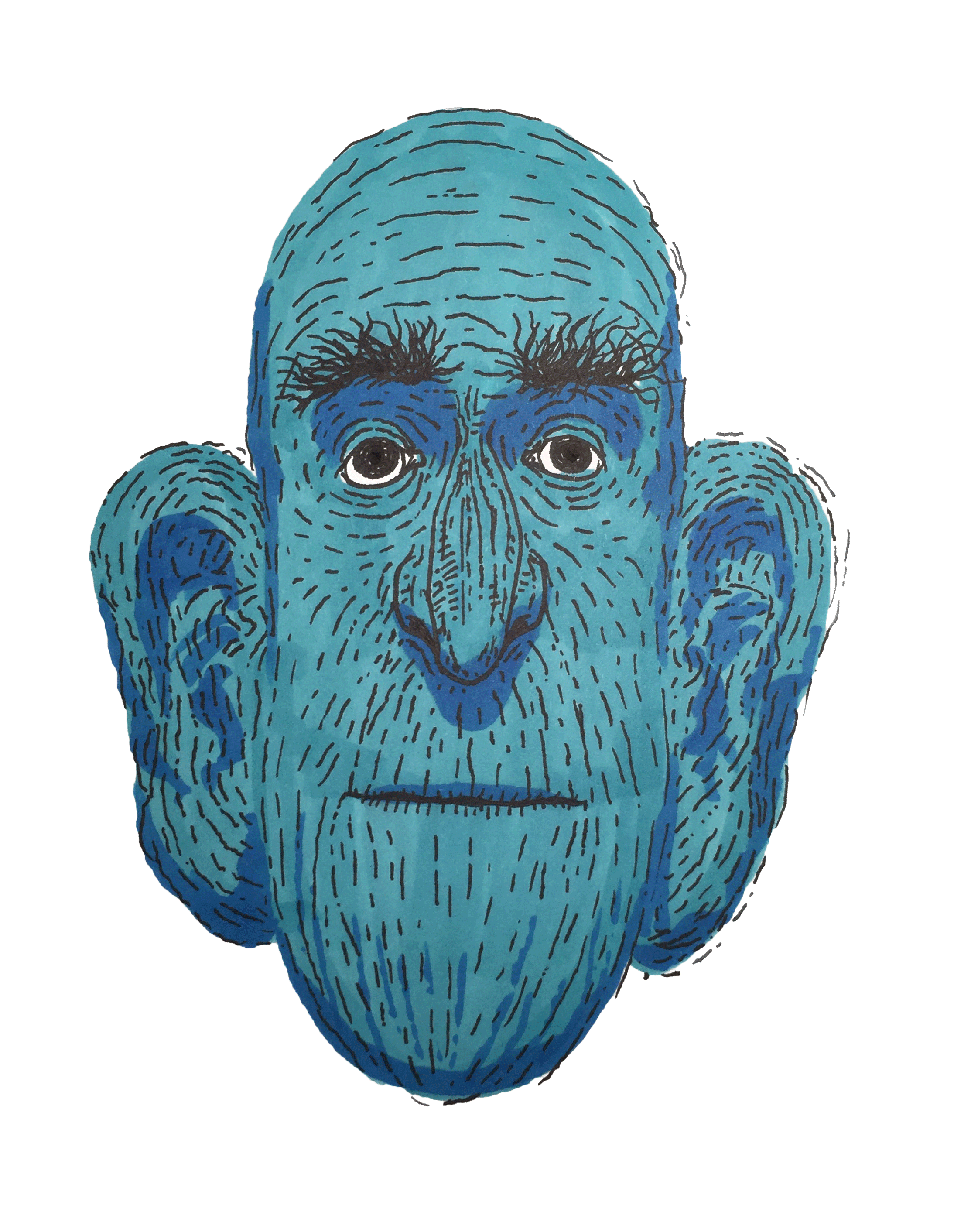Archibald Skol has already lived longer than he intended. Longer than most of the other children in his war-torn corner of the world. Longer than his parents, though that wasn’t hard – his mother died in childbirth, and his father did something to upset a firing squad shortly after. Archibald was raised, tutored and protected by two forces that war within his stomach: a bottomless hunger, and a desire to die.
Archibald became the dictator of his own little chunk of hell simply by being willing to take the risks a sane man wouldn’t. Even after seeing him lead his militias into rifle fire, eat his own poisoned food beside the enemies he was poisoning, wager an entire province in a game of Russian Roulette, his enemies assumed there must be some cost they could impose on him high enough to make him stop and negotiate. There was not.
He soon ran out of family for his enemies to abduct and torture. He ran out of enemies almost as quickly, though they reproduced. He ran out of friends as well, though he never really had any friends. He prefers carnivorous animals to people – his only friends are his hyenas and sharks and crocodiles – and when one of his crocodiles was stolen and killed and its entrails flamboyantly displayed, he simply bought a new crocodile and gave it the same name as the old one. The crocodile was immortal, as Archibald himself seemed to be.
As he grows older and more powerful, his schemes grow ever more elaborate. He wants to hold the rain hostage. He wants to design a weaponized termite. He wants to turn every diamond ring in the world into a homing beacon for his fleet of military drones, so that every happy couple must turn over their jewels on pain of death. The people who try to stop him these days are a different breed than the petty despots he murdered in his youth. These men and women have miraculous powers; abilities that would let them snap his neck with a thought, but they never do. They too seem to believe there is some cost they can impose so high that it will discourage Archibald from striking again. But everything they take from him – his ring finger, his eye, his caribbean fortress – is simply something they can never take from him again.
Archibald grows weary of these games. He meant to burn twice as bright and half as long, but now has burned both bright and long, and is in danger of burning out. The jewels and delicacies with which he stokes his furnace will not sustain him forever, he hopes. He is ready for hell – he grew up in it. There is a certain nostalgia there. And if he has to build that hell on earth to finally return there, then so be it.
Category: Kevin Bertram
93. Archibald Skoal
92. Chet Sling
Look, if you wanna get overcharged, nickled and dimed, talked down to and informed on, you can go to any mechanic in the damn city. That’s your business. If you want a guy who’s discrete, who understands, who’ll replace your arm and your leg without it costing you one of each, you want my man Chet. I mean look at me, man – hardly eight ounces of organic material left in my body, and I’ve been going to nobody but Chet for sixteen years now. I’m still walking, ain’t I? So listen.
Say you get your shiny new hand chewed up by a too-agressive handshake. The dealership’s gonna charge you out the bionic nose for new tendons, chassis, brand new ball bearings, and they’ll probably sneak in a firmware update that files a report every time you jack off. Chet, on the other hand, will not only salvage half the parts from an arm nobody’s using anymore, but he’ll give your insurance company a whole sob story about how your entire arm has become misaligned in a subtle but critical way, and them to pay for chrome plating, EM sensing, and a Magic Eyeball into the bargain.
I remember one time I decoupled my elbow joint arm wrestling. Chet takes a look at me, sees that my shoulderplate could use a new coat of paint and a couple other things, and then you know what he does? Takes me around the corner with a ballpeen hammer and beats the bolts out of me like I owe him money. Thought he was crazy at first (that was a long time ago, now I know he’s crazy), but then he goes and blames all the damage on a bar fight I got into after the arm-wrestling went sour, and insurance ends up buying me a brand new arm – Tyr-10, chrome black, MSAC interface and LED mood lightning. See?
Another time I went to him because my legs failed the safety exam. They were running fine, you know, but I like vintage parts and the inspectors are harder on the old models because legs have supposedly gotten a lot safer in the last five years. The inspector I went to – clean cut prick without a speck of blood on his overalls, fails me because the immobilization piston isn’t connected to the hydraulic regulator. Never mind the fact my legs have never gone haywire in six years of hard use (that’s old-world German crafstmanship for you), plus the fact I don’t like their being a circuit can render me a paraplegic at a moment’s notice. The guy tells me I’ve gotta replace the hydraulic valve on the piston – for twelve hundred bucks! So I take it to Chet and he says to me, “Boyo, never get your safety checks done anywhere but here.” And I don’t now, because you know how much he saved me? Eleven-hundred ninety. Just glued the rubber hydraulic hose onto the old valve, held it long enough for me to pass inspection, and that was that.
Yeah, I know how he looks. And I know he’s changed the name of his garage four times in the last five years – “Tom and Jerries,” to “Alliegant” to “Bodyworx” to “Zed’s Sandwiches,” – I know nothing he owns seems to have his name on it, not even his business cards. And I know he overcharges any customer he knows is just passing through town. He’s a cheater, all right? There it is. But it’s a world of cheaters, friend, and sometimes it’s good to have someone cheating on your side.
Plus, he’s always got pastries in the waiting room.
87. Diana Linden
When Diana Linden arrives home in the evening, or in the morning, or whenever she arrives home, she tosses her raincoat and hat onto the coatrack beside the door. She tosses her keys onto the hook on the wall beside the open microwave. She closes her umbrella and tosses it into the umbrella bucket after shaking the rain off, every drop of which ends up in the ficus pot on the windowsill. She opens the freezer and tosses a frozen meal into the open microwave, which shuts from the momentum. Then she goes to the microwave and starts it by hand. She hasn’t come up with a way to start the microwave by throwing yet – at least a way that doesn’t leave stuff all over her floor.
Diana’s routine would seem odd to anyone but her handlers at the CIA, or the diplomat she dates when they are both in town, or the friends who’ve known her since highschool, since before she was instructed to keep her talent to herself. She is, after all, the product of a covert breeding program. They did everything they could to grow her eyes. They snuck in bushbaby DNA, tailored viruses and irradiated proteins. It is a kind of wishing, to relentlessly express an intention in human flesh. And the wish was granted: Diana can indeed throw anything and have it land where she wants it to.
She’s not a killer. The things she throws don’t fly with deadly speed, especially if the trajectory is complex. She is a foolproof method for delivering messages. She will stand atop the Burj Khalifa, look down at the city and see, the way they wanted her to. In other words, she sees cubism. Every side of every building in Dubai, with wind patterns impressionistically overlaid. She will let go of her paper airplane with the barest twitch of the wrist, and it will go where it’s supposed to go. Only the barest providence is involved in her success. The rest is skill.
When Diana Linden leaves her apartment in the morning, or in the evening, or whenever they tell her to leave, she opens the microwave, and takes her keys from the hook next to it. She gives the ficus plenty of water, not knowing when she will return. She puts on her hat and coat from the coat rack, and takes her umbrella from the umbrella bucket. It all seems rather ordinary, considering. But she is only exceptional at throwing. She has no special way of making things come to her.
86. Galen Gorsky
Galen Gorsky got into philosophy for the conflict. He is never happier than when he is eviscerating some poor fool’s metaphysics (though, to be fair, he is never really happy.) He breaks syllogisms across his bulky knee, sinks his canines into underdeveloped assumptions and pumps them full of poetic venom. He chooses as his everyday victims the very weakest theses, the most tortured investigations, the inbred monographs that wear their fallacies on the outside like defective organs. But Galen is a big game hunter also. He wraps rough, thick chord around the stilt-like legs supporting high-flown works of theory, yanking them ignobly to the ground so that he can feast on their eyeballs. He is a monster – all his colleagues know it – but he is a very good monster, and that is why he has tenure.
Galen is not always right – though he often is. His own arguments have been known to rely too heavily on conjecture, to rest on questionable assumptions, to hide gaping holes in nests of circular argumentation. But though he is not always right, he is always angry. He is always, in fact, the most angry, and no critic can hold up under the seemingly endless torrent of vitriol that Professor Gorsky pours out upon those who dare criticize him in any medium. He is active on every social media platform, every philosophy forum and every online journal. He is searching for his name. He is commenting on thinkpieces. He is awake at four o’clock in the morning, mobilizing his followers.
Because he does have a following – his well worded tirades speak to the less eloquent rage boiling up inside his devotees. When his torrent of abuse ends (perhaps because he has moved on to a new target, or said his piece, or merely gone to sleep), it is not the end of his victim’s troubles; it is only the beginning of the secondary abuse. The rage that drives the attack is an iceberg, and Galen is only the part above the ocean. His people are drowning in icy salt water. There are an awful lot of them down there.
We could devise theories as to the origin of the professor’s fury. We could argue whether it is even the professor’s fury, whether he is the origin of it, whether he is lonely or impotent or unable to cope with his receding hairline. It is true that Professor Gorsky is unmarried, and that he has no children, and that none of his siblings talk to him or invite him to family gatherings. But as he himself would point out, there’s no solid argumentative basis for causal conjecture here. Instead, imagine the future: Perhaps, one day, the furnace of this man’s anger will forge a shining truth, tempered by fierce debate, honed by razor wits. Perhaps it will be stronger for the bloodshed. How much would that truth need to be worth, to be worth it?
85. Patrick Nguyen
Hardly anybody notices that Pat’s a monster, and those that know don’t think much of it. He’s so obviously an ordinary, stand-up American Joe that the the third eye is actually a little reassuring: even his hideous secret isn’t secret. He could easily hide the eye beneath the brim of his ever-present baseball cap (or so the thinking goes; in reality that would be very uncomfortable). That he chooses not to hide his extraneous eyeballs shows that he’s got nothing to hide.
Monsters aren’t entirely unheard of in this day and age, anyway. Oni-ism is tied to a recessive gene that’s just starting to get attention in the medical community. It traces back to certain rarified lineages in East and Central Asia. Patrick’s thrice-great grandmother on his mother’s side, as a matter of fact, was a giantess who slew a thousand adventurers before one won her heart (with the help, of course, of a clever talking turtle and a cloak that could make itself out of anything.) His father’s grandfather was a shapeshifter who began life as a many-eyed insect, and ended life the husband of an unwitting girl from a local village. When Patrick’s parents met they had no idea of their ancestry – immigration tends to erase these irregularities from the record. To them, their son’s appearance was a mystery.
It’s not a mystery Patrick’s particularly interested in solving. He’s much more interested in cars. His third eye lets him do a kind of visual triangulation on a troubled engine, effortlessly finding the source of any inauspicious sound. He’s not the world’s best mechanic for all that, but he gets the job done without charging too much, and his customers trust him. His wife and kids love him, and the dog’s given up growling at him and taken to sleeping in his lap when he watches TV at night. Above all, it’s his incredible sincerity that lets him pull it off. He just has more of it than anybody else he knows. Because when he looks into your eyes with all three of his, you have to pick just two to look back into.
84. Ted Klepeznik
Ted Klepeznik plays bass drum in the New York philharmonic. It was a hard job to get – very hard. It took him three years of painstakingly scheduled auditions, all over the country, before he landed this one. He picked up and moved his family from Milwaukee to take it. His wife Tasha, who had been supporting them both for years on her administrative assistant’s salary, had no trouble finding work at a prestigious law firm. Still, New York City rent being what it is, Ted works as a parking lot attendant in the off season.
Working as a parking lot attendant is much the same as playing bass drum for the New York philharmonic orchestra. Both require a constant, relaxed attention – one must not let notes slip by unplayed, or cars slip by unpaid. And both involve a great deal of waiting. Ted spends almost every day engaged in one kind of waiting or the other. Waiting to clock out of work, waiting in the parking lot of his children’s school, waiting to unleash the big-bellied thunder of his drum. Between the concert season and the off season and the school year, Ted spends three hundred sixty-four days a year waiting (or three-hundred sixty-five on leap years).
Ted spends most of the three-hundred sixty fifth day waiting as well, but that day is the day he is always waiting for. On that day he waits in the terminal at JFK airport, then on a cramped passenger plane, then at the baggage carousel at General Mitchell international airport, where he picks up his bass drum in its rugged plastic travel case. He rents a car and waits in traffic, until he escapes the city, and cruises eagerly to the secluded plantation-style mansion that is his destination.
It is on this day, once a year, that Ted Klepeznik plays bass drum in a marching band at an orgy. His family does not know this, but if they did learn of it they would find that his conduct is unimpeachable. He and his bandmates thread their way amongst the heaving bodies, providing a booming back-beat for the many-backed-beast. Ted’s eyes do not linger impolitely on the naked people – his eyes look straight ahead with unconcealed joy.
Ted is proud of the work he does for the marching band. It is, in fact,the greatest source of pride in his life. He’s been doing it for twenty-two years, since he graduated conservatory, and always for free. But Ted can’t tell the people in his daily life about the orgy. They wouldn’t understand. He’d be ridiculed. And so he got the job with the philharmonic. Now, when he waxes poetic about playing his bass drum for an ecstatic audience, his friends think he’s talking about the orchestra, and understand. You see, some people launder their money. But with his job at the orchestra, Ted Klepeznik launders his pride.
83. Fairoaks
Fairoaks is a self-taught professor of ecology. His ears are huge, elastic, and so sensitive that when an airplane passes overhead, Fairoaks can hear the
passengers conversing. He is nine feet tall, his skin is blue, and he always wears the same green tweed jacket with the same brown suede elbowpads. But what makes Fairoaks special is this: only one person in the whole entire world can see him.
The person is a little girl named Emily, and Fairoaks is her private tutor. He tells her of the green things her citybound life prevents her from ever seeing. He sits on the edge of the pot of aloe in her living room – he is tall, yes, but very very skinny – and describes forests where the spaces between roots are other roots, and leafy creatures fight a slow, mortal dance for drops of sunlight. Emily wants to go to those places, but Fairoaks cannot take her. He fears the anger of her parents, he says. Fairoaks has no parents and Emily, being young, envies him this.
When Fairoaks is not with Emily, he is alone. After all, no one else can see him. The other tall, thin people – with whom he used to dance a manic jig to complement the forest’s slow one – died long ago, or at least ceased to be visible to one another. On nights when Emily has friends over, or when she is in a foul mood or away on a field trip, Fairoaks visits the old glens. On those nights, he sleeps swaddled in his ears, and tries to imagine the dreams his charge is having.
82. Seymour
Seymour is the best in the world at two things. One is eating, and the other is research. He’s won a shelf full of trophies for his eating, in every category and division imaginable. Hotdogs, heads of lettuce, bowls of rice, and wheelbarrows full of shrimp have all vanished into his massive mouth, as if they had no mass, as if they were merely clouds in the shape of food. He’s won so many titles that all the regular competitors call him GP – short for “Grand Prize” – and it’s become a tradition among eating contest competitors to take GP out for a big meal before a big contest – hoping to fill him up and give themselves an edge. It never works, of course, but Seymour is happy to let them try.
Seymour’s never won any prizes for his research, but that’s because he only uses it for the benefit of the clients at his travel agency. Even in this age of quick online bookings, Seymour maintains a more-than-healthy client base. He doesn’t have a computer in his office, just an old corded phone, and when one of his clients tells him they want a ticket to Hawaii or Athens or Kyoto he picks that phone up and starts making calls. He calls the friends he’s made at all the major airports. He calls the agencies that monitor the weather along the flight path. He calls the domestic partner of American Airlines’ CEO. When he’s done making his calls, he’ll have a booking for half the expected price – one that won’t be cancelled for bad weather, and may even be eligible for a free upgrade. His clients love him. Some of them are quite young to be using a travel agent.
Seymour grew up during the tail end of the Great Depression. When jobs were scarce, his family had to find a way to fill their needs directly, without recourse to cash. That was when Seymour learned that getting what you want isn’t about what you have, or even what you know; getting what you need – as he learned from his friend at the grocery store, and his sister at the barber shop, and the apprentice at the tailor’s who owed him a favor – getting what you need is about who you know. He promised himself he’d never forget that, and he hasn’t. He also promised himself something else: that if he ever made it to a place in his life where food was plentiful, he’d be sure to take advantage.
81. Zombo
Shh … no, not so loud. He doesn’t know yet. He never was especially bright, which is why we always called him Zombo, which is … yes, a little bit ironic now. Okay, a lot ironic. But look, he seems to like bowling with us, and it’s not like he’s trying to bite anyone. I think he’s the Haitian kind of zombie. You know, animated by a witch doctor’s curse and subject to his master’s will? I don’t think he needs brains to survive. I’ve only seen him drink milkshakes.
He’s a terrible bowler now – keeps leaving fingertips in the finger holes – but he wasn’t much better before. And we were – and are – a pretty terrible team. We kept Zombo on the team because somehow it made it more tolerable to lose when we had that smile on our side. He was always – sorry, is always so happy just to be hanging out at the alley, throwing the ball down the lane … it helps you remember that bowling is a game, you know? With the competitive circuit like it is, everybody in their custom shoes and gloves and sweatbands and hissing profanity at each other under their breath … well, it’s easy to forget that we do this for fun.
Family? What? Zombo’s got no family! He grew up with his aunt, who barely tolerates him, and besides that all he has are his co-workers at the gas station and us. And half of us are his co-workers at the gas station, so there you go. That’s why we were so happy when he first started telling us about his new friends. How were we supposed to know they were a death cult?
So yeah, I know, he’s an abomination or whatever. But he’s still smiling, isn’t he? I mean, he doesn’t talk much, or really at all – just grunts and groans – but that smile must mean something, right? And if he’s not harming anybody, and he seems happy, why not let him be?
Whoa, Zombo! That’s six points, buddy! Not bad! High four!
Just … don’t say anything to him about it okay?
80. Stub
Nobody in Grim Barge could quite tell you what it is Stub does. All anyone can agree on is, it’s certainly not legal, but it’s not exactly bad either. It’s not that Stub is secretive. Everybody knows you can find him from 3 every evening to 2 every morning, lounging around the Blue Tip Saloon. He drinks with the other regulars, and makes jokes, and tells a story about a very big fish he caught once, with human teeth. It’s his customers that are secretive. In fact, it might not even be right to call them customers. All that happens is, about two or three times a day, never at quite the same times, guys come into the saloon and give Stub their money.
When they come in to give him the money, there’s no conversation. Stub takes the money without counting it and puts it in a drawstring bag that used to hold a bottle of Crown Royal whisky, and says “thanks.” Sometimes he smiles a dumb little smile. Then whoever brought him the money goes out.
Most of the guys who come in for Stub are strangers. Sometimes the guys are from around town. If you try to ask them what the money’s for, they’ll say something like “I owed him for a pizza”, or “he won it off me in a bet.” But it happens every day, and sometimes the wads of bills seem pretty thick. Nothing bad’s ever happened to anyone who came in and gave Stub money. Maybe that’s why they do it.
Stub’s an okay pool player – only competitive by virtue of how much time he spends hanging around the table. He rarely wins because he doesn’t have the cleverness to pull off a complicated shot. When one of his opponents scratches, he has a way of picking up the cue ball so that it seems to disappear into his meaty fist. They’re surprisingly large, those fists.
Overall, Stub’s a decent guy – anyone in Grim Barge would tell you the same. He’s a little simple and he drinks a little more than maybe’s good for him, but he’s never hurt a soul. And for that reason we’re all of us sort of thankful his payments keep coming in, whatever they are. Because he’s never hurt any of us, and maybe those payments are keeping it that way.









